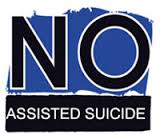I AM not evil. According to Brittany Maynard, I am. Maynard was the 29-year-old terminally ill woman who moved from California to Oregon so she could commit suicide on Nov. 1. I am not evil, and I refuse to be an apologist for what we are talking about across these not-so-United States. The New Jersey Death With Dignity Act is mislabeled. The function of such a law is to allow people to end their lives — and that is called suicide.
Maynard, an eloquent advocate for her cause, told People magazine, “For people to argue against this choice for sick people really seems evil to me.” On Thursday, 41 members of the state Assembly apparently agreed. By the slimmest of majorities, the 80-member chamber passed the so-called Death With Dignity bill.
The state Senate still must pass the bill before it could go to Governor Christie’s desk. Considering Christie’s pro-life stance, it is hard to envision him signing such a bill into law. There was not much debate in the Assembly, but what has been reported reveals some of the passion behind the legislation.
Assemblyman Patrick Diegnan, D-Middlesex, told of his mother’s last days. She had wasted away to 50 pounds and would tell him she wished she could die. There is no easy answer here. Legislation that will affect every person living in New Jersey should not be the byproduct of any individual’s personal loss.
Yet we see in state legislatures and Congress just that — the proliferation of laws that bear the first name of a victim of a crime or a natural calamity. These bills become laws because legislators find that spot inside constituents that wants to end brutality or suffering and come up with legislation that generally does not solve the problems, only salves the wounds.
The sincerity of the bill’s supporters is real. But the opposition is sincere, as well. There are religious forces at play, and there are more basic moral ones, not aligned to any one given faith. Despite the procedural safeguards that should prevent someone in momentary depression from committing suicide, this is a dangerous line for a state to cross. Because if we buy into the argument that this is all about personal liberty and no one has the right to tell anyone when to end their life, then suicide without checks and balances becomes not only justifiable, but a protected right. While many New Jerseyans may be fine with the overall concept of allowing terminally ill people the choice of killing themselves, in practice it might not be so black and white.
We all want to cheat death. And sometimes people defy their diagnosis. The headlines over Maynard’s decision may be recent, but the actress Valerie Harper made news when she went public with her diagnosis of terminal brain cancer. She was given three months to live — two years ago.
Terminally ill patients would have to be of sound mind when they decide to end their lives under this proposed bill. So the case of a dying parent in the final throes of a horrible death may not really be applicable. The decision to die would have had to be made and acted upon long before that stage was reached.
Some proponents of this legislation also claim that the health care industry is preventing terminally ill patients from dying because there is money to be made by forcing these patients to undergo needless medical procedures and treatments. Well, in this new America where all citizens must have health insurance, the opposite could become true — insurers could encourage patients with costly end-of-life illnesses to choose a quicker death.
If I am uncomfortable with the possibility that insurance companies could determine if I live or die — and I am — I am more frightened when legislators take on that role; I cannot think of a collective body more lacking in moral and intellectual integrity. Whether it is a state legislature or Congress, these chambers are political entities with members who vote with one eye on the next election and the other eye on the one beyond that one.
The law should be free of such political taint, but it is not. There may be enough support for the Assembly bill to bring it to the state Senate. Not for nothing, but the president of the state Senate intends to run for governor, and I am not sure he would want to have this piece of legislation on his résumé in 2017.
There is no way of knowing whether the individuals who chose suicide would have died the horrible deaths they chose to avoid. Without that irrefutable evidence, we are left with the stories of the terrible deaths of people we have known and loved as the primary reason for embracing state-sanctioned suicide.
My mother had Alzheimer’s. By the time she died, she no longer could walk, speak or understand any conversation. She was not in pain, which was a blessing. But she was robbed of her personality; no caregiver saw the dynamic woman she had once been. Should people with Alzheimer’s be given the option to end their lives while they still have their ability to reason? If more states become like Oregon, perhaps the answer one day will be yes.
The Assembly passed a bill claiming it allows dying people to retain their dignity. The Legislature is not in the dignity business. Dignity is innate; it can’t be legislated into existence. Alleviating pain and misery is a noble goal; state-sanctioned suicide is not.
If that makes me evil, I don’t want to know society’s definition of good.
Alfred P. Doblin is the editorial page editor of The Record. Contact him at doblin@northjersey.com. Follow AlfredPDoblin on Twitter.
